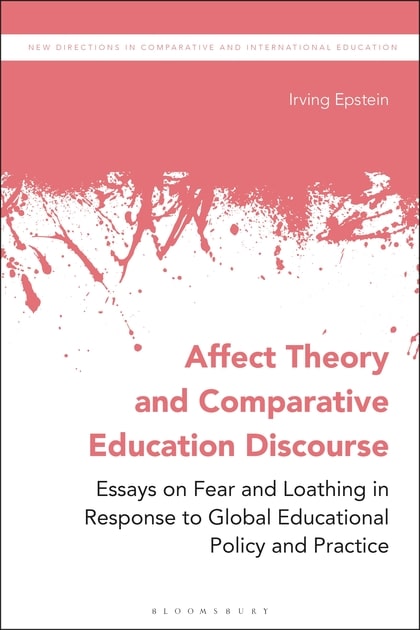 Today we explore affect theory in comparative education.
Today we explore affect theory in comparative education.
With me is Irv Epstein, the Ben and Susan Rhodes Professor of Peace and Social Justice at Illinois Wesleyan University, where he chairs the Department of Educational Studies and directs the Center for Human Rights and Social Justice. Irv’s new book is called Affect Theory and Comparative Education Discourse which was published in Bloomsbury’s New Directions in Comparative Education book series, which he co-edits.
Citation: Epstein, Irving, interview with Will Brehm, FreshEd, 187, podcast audio, February 17, 2020. https://www.freshedpodcast.com/irvingepstein/
Transcript, Translation, and Resources:
Will Brehm 1:56
Irv Epstein, welcome back to FreshEd.
Irving Epstein 1:58
Thank you.
Will Brehm 1:59
So, I want to jump right into, perhaps, a very large question, but, by way of context, for the conversation we’re going to have going forward. And that’s about particular ideological and hegemonic tendencies in the field of comparative education. How do you see some of these ideologies and hegemonic tendencies in our field?
Irving Epstein 2:22
So, let me start by looking at some of the ideological aspects and then talking about hegemonic tendencies. I guess, I would say with regard to ideological issues, and this has been commented upon by many in the past, so it’s not all new. But, in the book, I look at a number of different areas, including policy studies, development studies, international development studies, tensions within progressive education, educational modernism, and then look at issues of hegemony. So, with regard to the policy studies literature, you know, policy studies, at least in North America, originated as a result of people during World War II, trying to depoliticize the nature of decision making and policy formation. And that led to a positivism, or embrace of positivism, which was relevant after World War II during the cold war. And so, we see within policy studies an embrace of rational choice theory, and then generally positivism. Education, as other public policy issues, was seen as a public good, but not having to prove itself, as such, and that pretty much has marked the nature of policy studies since then. With regard to international development studies, again the cold war influences, both with regard to the international institutions which were created – including the World Bank and others that really serve to maintain North American and Western dominance of the world economy in the 50s, late 40s and 50s – as well as cold war influences with regard to the contestation for support against the Soviet Union and therefore, you have to look at human capital theory, structural functionalism and modernization theory within that context. And then in the 60s and 70s, with regard to the international development literature, conflict theory evolves, particularly dependency theory where structural inequality is understood, and mentioned and noted. You also have humanist alternatives, including Freirean pedagogy, which embraced liberation theology, and more recently the capabilities approach of Nussbaum and Sen, which is more of a kind of philosophical liberalism. So, you have these kinds of different ideological trends, but they don’t seem to really reconcile too well with one another, both within those two areas. And then you have basic conflicts within progressive education, from its start, and its inability to reconcile humanistic perspectives with ones which are more behaviorist, an emphasis on measurement and accountability, and then the conflict between the individualism of the child-centered approach, as opposed to social approaches toward pedagogy. So, in all of those areas, I would argue that comparative education has pretty much cannibalized some of the theories without really reconciling them, or really creating its own ethos.
Will Brehm 6:14
So, what would be some of these hegemonic tendencies that you see then?
Irving Epstein 6:18
hegemonic tendency is really, ‘my way is the only way’. Right. And so what we see, that’s particularly with regard to overall a sense of educational modernism, we view things such as the graded curriculum or competition is an indication of success, importance of an age-based curriculum, hierarchy and specialization … are … as characteristics of educational systems, as all being uncontested. And, with regard to the other ideological approaches, there seems to be a sense that education is generically public good. That regardless of the problems of education, if …there … it is fixed or if policies are made to work, then that will be a good thing, and a useful thing. And what that does not account for … are the … is the possibility that instead of being inclusive, these policies actually are exclusive. And instead of being creative, they are not only exclusionary, but also categorize and rigidify ways of looking at the world, and ways of approaching important policies, practices and issues.
Will Brehm 7:45
So, what would be an example of, you know, such a policy that is exclusive in your mind and all those other things that, you know, the educational modernism and the sort of ideological debates within the field of education … have … have resulted in?
Irving Epstein 8:01
Well, we would say, for instance, that education is a solution. It’s a solution to poverty, it’s a solution to health. It’s a solution to, you know, well-being. And we see that in individualist terms, right? You work hard, you do well, your performance reflects your ability and talent, it’s meritorious, and therefore you’re rewarded, as a result society benefits. Well, for many people, just the opposite is the case, education is destructive, it is destructive of personal sense of self-worth. If you’re told why are you fail? What does that mean in terms of what education is saying about who you are, what your identity is? What does it mean when you’re schooled in a language that’s not your own, where religious preferences are ignored, where community really is not valued? So, what is valued, as a result of receiving your education, is leaving the community, going away, right? … for personal benefit. So, those are some of the areas that I think, you know, where we really do not come to terms with some of the tensions and issues that people, in their day to day lives, experience and confront with regard to educational provision.
Will Brehm 9:32
So, then how do some of these, you know, these people that aren’t necessarily making up … the … the policies and practices or conducting the research in some, you know, educational modernist way, how do these sort of everyday people generally respond to such modernist ideas?
Irving Epstein 9:51
So … the conceit of this book is to argue that in some ways they seek alternatives, because they are fearful that their basic needs and existential questions which they confront, are not being met by the school system. And, in some ways they react more forcefully and reject educational practice totalistically, and confront it, openly. And so, the conceit of this book is to look at case studies of what I call ‘fear’ and what I call ‘loathing’. And, the fear and loathing is, you know, taken from Hunter Thompson’s work. Hunter S. Thompson was the American journalist of the 60s, famous for … in … injecting himself into his stories and into his journalistic accounts, decrying the notion of distance and objectivity in terms of reporting. But in his books, ‘Fear and Loathing in Las Vegas’ and ‘Fear and Loathing on The Campaign Trail’ and other works, he tried to come to terms with popular sentiment that really was not being reported at the time. And so, this work is an attempt to borrow from that framework and look at ways in which some of these visceral feelings are just not understood or not necessarily embraced by policymakers.
Will Brehm 11:26
So, what would be some examples of fear that you see, that you could point to?
Irving Epstein 11:32
So, in the book, I look at three examples of fear: one, I look at memorialization of mass atrocity in Chile, in the aftermath of the Pinochet dictatorship. And I look at efforts to memorialize, and to come to terms, and to remember that era, which goes far beyond what is offered in the schools. And because what’s offered in the schools is so limited and so insufficient, you have these other options for different memorials and attempts to come to terms with the past. And not all of them are successful, but at the same time there is this need to gravitate away from the school system because … it’s … it’s so insufficient. And then, a second example I look at is the issue of aesthetics, and education, particularly music. And, I look at examples from Venezuela, the El Sistema movement, which really created the notion of World Youth orchestras, again, totally outside of the classroom. And then, look at two examples from the United States: one, the Playing for Change Foundation, which has created music schools around the world through embracing …through …. video street musicians and international musicians coming together to perform common music. And then the Blues Kids Foundation out of Chicago, a retired substitute teacher creating music camps to promote the blues, in a number of different venues. All of these are examples of looking at educational endeavors outside of the formal schooling process. And then the third example that I give is the Sport for Development movement, with particular respect to Kenya and South Africa. And they are, in that case, the embrace of club sports, particularly for football … as opposed … with lots of money being given for a sports evangelist perspective, that sports is going to create character development, it’s going to help solve AIDS, it’s going to help with racism, and so on and so forth. Yet, physical education is pretty much ignored, or it’s given short shrift within the regular school system. Well, in all of these instances, it’s not necessarily clear that there’s evidence that these alternatives necessarily work. But there is a real strong faith that they do work, or they will work, or they are important. And I find that to be quite interesting,
Will Brehm 14:21
Right. So, all of these people that basically might see the downfall, in different ways, of public schooling have sought alternatives to, sort of, fill in these gaps and they believe that … it’s … it’s working. So, what about loathing, you know … that … it’s sort of a slightly different take than fear? Fear perhaps helps people seek alternatives, loathing, sort of, can create, you know, much different feelings, maybe more powerful feelings, that can result in some pretty bad outcomes, really. So, you know, what sort of examples can you look at in terms of loathing, these sort of modernists school policies and practices?
Irving Epstein 15:03
So, I give three examples. The first example is looking generically a global school violence. And the argument that I’m making here is that schools themselves are violent places. And … and … do that looking at issues of bullying, looking at issues of cyberbullying, looking at issues of teen suicide as a result of reactions and interactions within school walls, looking at issues of corporal punishment. And so, the school walls aren’t necessarily protective in and of themselves. They don’t acknowledge the violence that goes on in everyday life … that goes on … that kids bring to them from their communities and families. They promote hegemonic masculinity, in ways that create violence. And, so you see, in a sense … in part of this chapter you see a sense … that … that schools themselves as … be … becoming targets of active violence as a reaction to what they’re doing or not doing for children, initially. You also have a case, when you look at higher education, of schools really being associated with the state. And, the state as a political actor, obviously is not neutral. But, the efforts to take over universities, to have military take over student dorms … to … as well as to destroy the universities themselves, and to attack scholars, teachers, students. All of that says something about the way in which any legitimacy for the higher education institution is sort of rejected as conflict with the state ensues. So that’s one example. And then, the second example that I look at is global youth protests, which I’ve written about before … but go back and look at the ways in which in different settings, youth … you know … take grievance, which is really devoted to their own educational and higher educational experiences, in terms of affordability, unemployment, lack of affordability, gross unemployment, and unfairness with regard to issues of admission, and so on so forth, and allow that to really tackle not only educational institutions, but government institutions more generally, a lack of faith in government institutions, more generally. So what we consider there is this notion of ‘identity salience’, the fact that students own cause is then popularly adapted by mass protest, because people see grievance in terms of their own lives … and the … own … inability of the state or of the government to address their needs. And so, we have, with regard to student protests or youth protests, a categorical rejection of institutional policy. And then the third example that I give is what I call ‘self-loathing’, of the embrace of bibliometrics and the World Class University Rankings system. And, in that case, on our own the university professoriate really engaged in this process of self-loathing, self-hatred by promoting these statistics, and promoting these metrics, which we know make no sense. And embracing a World Rankings system that is not rationally defensible, we do that because of our own feelings of inadequacy and uncertainty, and the need for status, and the need for some kind of certainty with respect to who we are and what we do. And, what that does, it destroys sense of institutional mission and uniqueness, sense of the creativity of the education process, with the teaching process or creativity in terms of research. So those are the three examples of loathing that I give in the book.
Will Brehm 19:34
It’s such a fascinating take of very diverse examples from all over the world that seemingly are disconnected but, sort of, fall under this framework of fear and loathing. But you actually go one step further, you … you … begin to apply and think through these different examples using affect theory … and … or aspects of affect theory. Now, I don’t perhaps know everything about affect theory, so could you just give, you know, a quick overview of what are some of the important elements of affect theory, just for someone, you know, like myself who doesn’t necessarily know?
Irving Epstein 20:15
So, I think of affect theory in terms of four different themes, or characteristics. The first is intensity of encounter. And that really is taken from the work of Deleuze and Guattari and Brian Massumi. And the notion there is that rather than thinking of the autonomous individual, in terms of making choices in life, we encounter our world with a degree of intensity … that … and interconnectedness that really shapes everything that we do. And …that … those encounters are really underappreciated. So, the second aspect of affect theory involves assemblage, and assemblage means that we naturally try to come together with one another. We’re social beings, social creatures. And the notion of assemblage is … a … a notion not simply of, I’d say, a strict notion of communitarianism, where the community is always well-defined or well-developed. But we come together, and then we separate, and come together. But, the notion of coming together …is … through assemblage is quite important. A third aspect of affect theory that I embrace is meaning-making, and by meaning-making we’re talking about making connections, both in terms of actions and ideas, so I use the work of Margaret Wetherell who, as a social scientist, has decried the ways in which we divorce notions of discourse from notions of policy, or policymaking, where we think that thought and action, really, are not part of the same continuum. And then finally, the other aspect of affect theory, which I think is important, is contingency. All of … the … the intensity of encounters, assemblage, meaning-making, they’re not permanent. They’re not, you know, they’re not set in stone. They occur over short durations. They recombine in different ways. But a healthy respect for contingency, in terms of our policymaking and our actions, and our educational procedures, is really, really useful and is quite important. So those are the four aspects of affect theory that I … embrace in this work.
Will Brehm 23:02
And why are they helpful to you, thinking through these examples, thinking through the modernist educational policies and practices?
Irving Epstein 23:12
Well, I think … they … so they ask us to be skeptical, first of all. And, I think that they, they allow for certain things. So, for instance, ‘intensity of encounter’ challenges conventional notions of rationality. I would say ‘assemblage’ challenges conventional notions of autonomy and individualism. As I was saying before, meaning-making challenges conventional notions of separation of thought and action. And contingency challenges the notion of certainty and rigidity, that becomes part of the classification process, that, so much, characterizes comparative education efforts. So, I would say that, for instance, if we’re talking about things, such as ‘inclusivity’ affect theory has made a major contribution to post-humanism, particularly through the notion of ‘intensity of encounter’. It’s important with regard to environmental awareness, the expansiveness of meaning-making leaves room for indigenous knowledge, which has often been rejected by conventional researchers in lieu of pseudo-scientific and social scientific paradigms. So, in all of these cases, I think there is the promise for more inclusivity if these notions are adopted,
Will Brehm 24:40
And do you see this ‘inclusivity’ in any of the examples that you brought in earlier on?
Irving Epstein 24:46
Well, I guess I would say, so for instance, when we look at issues of fear, right? For those three examples that we give, we’re looking at existential questions, questions of memory and identity. Questions of personal expression through the arts, and questions of disciplining the body through sport. And, at the same time, when we look at conventional educational solutions … education … educational practice and policy is narrowing rather than expanding the notion … of … of what’s important, of what’s relevant, of what we should focus upon. So, to the extent that people look for those solutions, … which … some of which are educational, in other realms, there is … a … an inclusivity there. And then when we look at the issue of, you know, loathing, it seems to me that it presents the challenge to become more inclusive. Because, you know, when we look at, you know, globally, things … that … such as Trumpism, or, you know, the Brexit … popular populism, coming to terms with educational elitism is something that we haven’t really done well, and understanding the real harm that policies promote through lack of recognition of popular sentiment, of the ways in which people identify themselves, is quite costly. So, I think that these examples give some evidence for the importance of becoming more inclusive.
Will Brehm 26:34
Yeah, right. And using things like affect theory or elements of affect theory to help, sort of, I want to use the term ‘unlock’ somehow, you know, I mean, we’re unlocking, sort of, our understanding and pushing into new ways through affect theory. It occurs to me though, and I would love your opinion on this, you know, is there an element, or are you fearful, to use that word, that some of these ideas in affect theory could become ideological, could become hegemonic, just like the very theories and practices of, you know, modernist education that you’re critiquing now?
Irving Epstein 27:12
Yes, of course. So, let’s unpack this a little bit. So, affect theory, it arrives from cultural studies, it’s Eurocentric. One could argue that it’s no better than other social science theories … that … and the prospect of imposing these notions, let’s say on the Global South or on other thought traditions is there. But if … one gets so without …. one would have to do so without recognizing the importance of contingency, without reflecting upon the inclusive nature of these principles. So, to the extent that the principles, in fact, are inclusive or ask for levels of inclusivity, then, I think, they meet that critique. Within affect theory, though, there is not simply one affect theory, and there are affect theoreticians who disagree and argue with one another. So, for example, many who really focus upon issues of intensity of encounter, believe that intensity of encounter is true, not simply for human interactions, but non-human interactions as well. Whereas those who believe in meaning-making are really looking at ideas with regard to human interaction. So, you can argue as to what to emphasize, what not to emphasize. Early on, affect theoreticians embraced the work of Silvan Tompkins and Paul Ekman, who really argued that emotions were generic, almost universal, and fundamental. And, more recently, neuroscientists argue that that, in fact, is not true. So, there’s a lot argument that’s going on within this field. There are contradictions within the field. But, my hope is that by looking at these core themes … that they can, sort of, guide us … with not necessarily … without necessarily embracing them reflexively without critique, but they can be inclusive enough … enough for us to move our field forward.
Will Brehm 29:24
Well, Irv Epstein, thank you so much for joining FreshEd. It’s a really fascinating topic. You know, I think affect theory, or the different aspects of affect theory, really do push our field in new directions, and hopefully get us beyond the whole ‘looking for best practices’.
Irving Epstein 29:39
Thank you.
Affect Theory in Comparative Education










